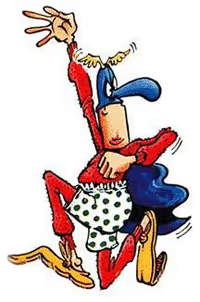Tom Jones (1963) - Worst Best Picture ever?
#50Tom Jones (1963) - Worst Best Picture ever?
Posted: 3/9/14 at 11:22am
I like Oliver! more than most but I have to say after a certain character dies the happy numbers feel not so jolly. I know people think Reed was asleep at the wheel to film but I think he is excellent in directing the scenes and the atmosphere. He really wants to get a since of space and place. Plus, I think the performances are strong. Ron Moody beating Cliff Robertson would have been fine by me since I also think Robertson over O'Toole is a major Oscar roberry. That year was strange. No 2001 being the major Best Picture omission but also Rosemary's Baby felt underserved in all of the major categories.
Captain Newman, M.D. is not really a great thing to watch after seeing John Huston's Let There Be Light. Captain M.D. hasn't aged well whereas the Huston doc is probably one of the most important non-fiction documentations of PTSD and Darin's performance, the accent, the body language, is just over the top. I know some people were moved by it but all I see is Acting. TCM noted in its write-up of that film that many people felt Darin should've been nominated for a similar role earlier in Pressure Point. Oscar strategy and politicking is a fun rabbit hole.
I did actually enjoy Cat Balou when I saw it but I still cannot believe he won for it and that he beat Richard Burton in The Spy Who Came in From the Cold.
besty- I have to say, A Man for All Seasons is a strange one. Zinnemann was respected but a religious reformer biopic winning in the sixties just feels so very strange. Were Burton and Taylor still so toxic that Who's Afraid of Virginia Woolf? couldn't win? Was Mike Nichols too much of an up and comer, too associated with Nichols and May (as if there something wrong with that), to be taken seriously by the Academy?
#51Tom Jones (1963) - Worst Best Picture ever?
Posted: 3/9/14 at 11:28am
I actually love A Man for All Seasons and think it's one of the best of its kind (including films like Elizabeth, Anne of a Thousand Days, Mary Queen of Scots, etc.)
I don't take anything away from Burton's performance in Virginia Woolf, but I think Paul Scofield's work is certainly worthy of the recognition it received. It's a damn fine performance. Wendy Hiller, Orson Welles, Robert Shaw, and the under-appreciated John Hurt (in that film) are all great.
EDIT: As far as a "religious reformer" winning, again, that's the pendulum swinging back and forth, all throughout the '60s. If you look at the decade as a whole, you can see the tug-of-war going on with the sort of film that is voted the "best."
And wonkit----if you have read any of my previous posts on the Academy's "best" pictures, you know I'm not using them as a benchmark for "good." In fact, I'm sometimes agreeing with their choices and sometimes (like Tom Jones) completely disagreeing.
blocked: logan2, Diamonds3, Hamilton22
#52Tom Jones (1963) - Worst Best Picture ever?
Posted: 3/9/14 at 11:36am
It truly did seem that way. Also that year you had Antonioni nominated for Directing in Blow-Up along with Claude Lelouch for A Man and A Woman that did incredibly well in the major nominations. All while box office films like The Russians are Coming, The Russians are Coming are facing off with them in major categories.
I have vague memories for A Man of All Seasons but plan to check it out again.
#53Tom Jones (1963) - Worst Best Picture ever?
Posted: 3/9/14 at 11:47am
The interesting thing to me is how the 1960s are reflected in the Best Pic choices overall. That creative tug-of-war isn't evident in any previous decade during the Academy's history.
Even when an unusual choice like An American In Paris wins, it doesn't feel like whiplash watching them in order. After WWII, and even during, there were a string of B&W dramas dealing with heavy issues of the day, some wartime, others like alcoholism, antisemitism, even the inner turmoil of Shakespeare's Hamlet. When the Academy was faced with yet another choice between B&W dramas of the day (Streetcar vs. A Place in the Sun), they decided it was time for a change. A Technicolor musical from MGM with a risky 20-minute ballet as a capper. It actually feels like a breath of fresh air when you see them in order. The timing just wasn't right for the B&W dramas that year. And timing (often) is everything.
But making my way through the '60s, it feels like whiplash.
blocked: logan2, Diamonds3, Hamilton22
#54Tom Jones (1963) - Worst Best Picture ever?
Posted: 3/9/14 at 12:38pm
Just out of curiosity I wanted to know how the movie was received in general. TCM provides the following:
THE CRITICS' CORNER: TOM JONES
AWARDS & HONORS
Kicking off awards season, the National Board of Review named Tom Jones Best Picture and Tony Richardson Best Director.
Tom Jones placed sixth on the New York Times' ten best list for 1963.
The film captured New York Film Critics Awards for Best Picture, Director and Actor (Albert Finney).
Finney won the Best Actor Award at the Venice Film Festival, at which Tom Jones was nominated for the Golden Lion.
Tom Jones won Golden Globes for Best English-Language Foreign Film, Best Motion Picture-Musical/Comedy and Most Promising Newcomer (Finney). It also was nominated for Best Motion Picture Actor-Musical/Comedy (Finney), Best Director, Best Support Actor (Hugh Griffith) and Best Supporting Actress (Joan Greenwood).
The Writers Guild of Great Britain honored John Osborne for Best British Comedy Screenplay.
Tom Jones won the British Academy of Film and Television Arts (BAFTA) awards for Best Film, Best British Film and Best Screenplay. It also was nominated for Best British Actor (Finney and Griffith) and Best British Actress (Edith Evans).
The film captured Motion Picture Exhibitor magazine's Laurel Award for Top Comedy.
Tom Jones was nominated for an Eddie Award by the American Cinema Editors.
Pointing the way to his Oscar® victory, Tony Richardson won the Director's Guild Award.
Tom Jones received ten Oscar® nominations, including a record three for Best Supporting Actress (Diane Cilento, Edith Evans and Joyce Redman). It was also nominated for Best Actor (Albert Finney), Best Supporting Actor (Hugh Griffith) and Best Art Direction. It won for Best Picture, Director, Adapted Screenplay and Score.
John Addison's soundtrack recording won the Grammy Award.
In 1970, Los Angeles Times columnist Joyce Haber polled readers and industry members to name the greatest cinematic achievements of the '60s. Readers named Tom Jones the tenth best film overall, voted Albert Finney's the third best leading male performance in a comedy, Hugh Griffith's the second best supporting male comedy performance, John Osborne's screenplay the third best adaptation and Tony Richardson the best producer of a comedy. Industry members voted Griffith's performance the best supporting comedy performance by a male.
The Critics' Corner: Tom Jones
"There is nothing in this film that could give any member of the audience one moment of enjoyment."
- London Times
"Prepare yourself for one of the wildest, bawdiest and funniest comedies that a refreshingly agile filmmaker has ever brought to the screen....in finding a means of cinema expression in which to convey most suitably to our age the deceptively fastidious rhetoric and ribald wit of the Fielding work, Mr. Richardson and his scenarist, John Osborne of "Angry Young Man" fame, have worked out a structure and a rhythm that constitute a major creative achievement in themselves."
- Bosley Crowther, New York Times
"It is as though the camera had become a method actor: there are times when you wish you could buy, as on certain juke boxes, five minutes of silence....Obviously a film which elicits such lyric ejaculations from the reviewers cannot be all good."
- John Simon, New York magazine
"The film is a way-out, walleyed, wonderful exercise in cinema. It is also a social satire written in blood with a broadaxe. It is bawdy as the British were bawdy when a wench had to wear five petticoats to barricade her virtue."
- Time magazine
"Tom Jones is a continually delightful, mercurially rhapsodic, and altogether breath-taking film. There is, in fact, no detail, however small, which does not merit unstinting admiration. Tom Jones, an absolute triumph, is the best comedy ever made."
- Newsweek
"Tony Richardson whizzes through the Henry Fielding novel, but he pauses long enough for a great lewd eating scene."
- Pauline Kael, 5001 Nights at the Movies
"The picture is a mess, sometimes called a romp, and a tribute as much as anything to the sudden new appetite for things English...The young Albert Finney tried to hold it together, but, as he knew, Tom is a passive part. Everyone else has more fun.."
- David Thomson, Have You Seen...?
"A coarse and vibrant adaptation of Fielding's picaresque novel of the Eighteenth century, full of mischievous enthusiasm and robust caricature."
- Peter Cowie, Eighty Years of Cinema
"This full-blooded, joyful adaptation of Fielding's famous novel is full of fashionable cinematic tricks but its bawdy good humor brought it a justifiable commercial success."
- Georges Sadoul, Dictionary of Films
"A silent film-inspired, quick edit, slapstick prologue punctuated by explicative intertitles and a sprightly harpsichord accompaniment sets the irreverent, whimsical tone for Tony Richardson's freeverse adaptation of Henry Fielding's beloved eighteenth century novel, Tom Jones, transforming the beloved comedy of manners satire as a giddy fusion of burlesque and Keystone Kops epic adventure."
- Strictly Film School, http://filmref.com/
"...under Richardson's eye and Osborne's pen, the point gets almost missed. So intent are they kicking over the walls, that their Tom becomes little more than an adventurer like a Flashman or a Sharpe. Sure, there's a little social history and commentary loitering in the background, but such is the twinkle in Albert Finney's eye and the built-in impetus to wish for his escape from every predicament, that we lose sight of the satire."
- Iain Miller, The Independent on Sunday
"Richardson's England is full of 18th century atmospherics, but its big attraction was the bawdy licence it allowed '60s permissiveness. Osborne's courageous hatchet job on Fielding's 1,000 page classic novel and Finney's gutsy performance add up to produce an enjoyable piece of irreverent entertainment."
- Robert Murphy, TimeOut Film Guide
#55Tom Jones (1963) - Worst Best Picture ever?
Posted: 3/9/14 at 12:40pm
Told you I was in the minority!
It doesn't change my opinion of it one bit.
blocked: logan2, Diamonds3, Hamilton22
#56Tom Jones (1963) - Worst Best Picture ever?
Posted: 3/9/14 at 12:58pm
I will never understand the negative reaction to Reed's direction of Oliver. To me his work is masterful and the picture the most satisfying adaptation of a stage musical to screen (sharing the honor with Francesco Rosi's Carmen if we count opera).
I don't find A Man For All Seasons at all out of step with a 60s oscar win. More was not a religious reformer, he was quite the opposite. He was a religious conservative. it is Henry who rebelled against the church much to More's dismay; not the other way around. But Henry was a religious rebel for reasons none of which have to do with religion. And Henry during the time of his standoff with More had only one goal in religious transformation: to assert his own authority over the English Church which would by nearly every other measure remain identical with the Roman Church in England. Neither Henry nor More were Protestants.
But all of that is background. The movie is about a hero standing up to injustice... or at least for the values he feels committed to and his loyalty to the church and his own conscience... and standing up to the establishment - his king and the king's lackeys - at great personal cost to himself. Nothing could be more in tune with the zeitgeist of the mid 60s than that. What's more, the story made it easy for Hollywood to root for the anti-establishment (the establishment in question being the crown and not the church, and the geopolitical separateness of them which More held sacrosanct) protagonist, because what More stood for were traditional values and identity, whereas Henry stood for flouting them in an effort to stabilize the country, not repeat the horrors of the Lancastrian-Yorkist wars, provide an heir and change one wife for another.
Updated On: 3/10/14 at 12:58 PM
#57Tom Jones (1963) - Worst Best Picture ever?
Posted: 3/9/14 at 1:12pm
Nor should it best12. But if you read those reviews, you'll find they are hardly unanimously positive. They are all over the place from glowing to trashing and everything in between.
As I said, I'm not a huge fan of the movie, but I don't dislike it. There are wonderful supporting performances (Griffith is delightful and there are arguably more first rate performances by supporting women in featured roles (Evans, Cilento, Greenwood and Redmon) than any movie ever made (not surprising that it was the first time three women were nominated for best supporting actress (and poor Joan Greenwood, who was the sole golden globe nominee in that category not only didn't get an oscar nod but saw three of her co-stars getting one))))).
The movie also was in many ways extremely influential; ahead of its time in its far out self-reference, interruptive winks and asides, and sophomoric hip hijinks that would become trademarks of later 60s movies.
It's an ok movie winning in a year when there really weren't all that many great movies. It would have been nice of course if 8 1/2 would have won the oscar as best picture, but that wasn't likely to happen.
Personally, I'd take it any day over The English Patient, Out of Africa, Gentleman's Agreement, Titanic, Going My Way, Rain Man, Dances with Wolves, Braveheart, The Greatest Show on Earth, Forrest Gump, An American in Paris or Gladiator.
And if you ask me it's a better movie than Slumdog and at least on a par with Around the World in Eighty Days.
Updated On: 3/9/14 at 01:12 PM
#58Tom Jones (1963) - Worst Best Picture ever?
Posted: 3/9/14 at 2:25pm
Love your observations, henrik! I'm glad we agree about Carol Reed, too.
And reading what you wrote about A Man For All Seasons, it suddenly occurred to me that there is one common denominator in the Best Pics of 1965-1967, as different as they might seem. "The Sound of Music," "A Man For All Seasons, and "In the Heat of the Night" all have central characters increasingly at odds with the people and events around them, yet they remain true to themselves in the face of adversity. This common idea could be understood and appreciated by liberals and conservatives, older generations and younger generations alike.
blocked: logan2, Diamonds3, Hamilton22
wonkit
Broadway Legend Joined: 9/30/08
#59Tom Jones (1963) - Worst Best Picture ever?
Posted: 3/9/14 at 6:48pmI read several articles this year about the generational difference between the Academy's voters and the film-going public. That may also have been true in the 1960's.
#60Tom Jones (1963) - Worst Best Picture ever?
Posted: 3/9/14 at 7:23pm
A great point, wonkit.
The decade of the 1960s began 33 years after the Academy started giving awards, so it's a safe bet that a new generation of members were voting along with the older ones, some of whom were retired or had even passed away by that point.
blocked: logan2, Diamonds3, Hamilton22
#61Tom Jones (1963) - Worst Best Picture ever?
Posted: 3/9/14 at 7:56pm
These aren't funny scenarios. At least to me. They are abusive, and I don't feel like laughing at these misfortunes. They're ugly, and even in a parody, they aren't funny.
Though I am also in a very small minority, that is PRECISELY how I felt about Pulp Fiction. I saw it because everyone was raving about how hilarious it was. I never saw a single funny moment in the film. Instead, I just hated every second of it.
#62Tom Jones (1963) - Worst Best Picture ever?
Posted: 3/9/14 at 7:59pm
Why are you lumping it with Vanity Fair? Just curious since that was considerably later...
Carelessness. I know VANITY FAIR was written a century later, but something about its plot and rhythms has always struck me as more 18th century than 19th--even though it postdates Austen and is concurrent with Eliot..
And I haven't read PAMELA.
wonkit
Broadway Legend Joined: 9/30/08
#63Tom Jones (1963) - Worst Best Picture ever?
Posted: 3/9/14 at 8:22pmmister matt - my reaction to PULP FICTION, too. I was just repulsed by everything in it even though it is a favorite film of people whose opinions I otherwise respect.
#64Tom Jones (1963) - Worst Best Picture ever?
Posted: 3/9/14 at 9:46pm
I'm so glad you're brining up PULP FICTION, Mister Matt and wonkit!
I was thinking about that movie at one point while I was watching "Tom Jones." I kept thinking "Jones" must have been the "Pulp Fiction" of its day, made by edgy new filmmakers, almost thumbing their noses at a movie genre while at the same time celebrating it (to a degree). I resent filmmakers whose biggest statement is to show us they're smarter or cooler than others who have come before them. It turns me off in a huge way. (This is how I feel about most of the Coen brothers' movies.)
There is a mean-spiritedness and superiority that saps any intended humor right out of the work. And as a result, all I see are the endless flaws, because I'm not invested in the stories or characters. I usually hate both, so I sit there and pick everything else about them apart.
Personally, I liked Pulp Fiction, but it absolutely fits into the mold of Tom Jones.
blocked: logan2, Diamonds3, Hamilton22
#65Tom Jones (1963) - Worst Best Picture ever?
Posted: 3/10/14 at 10:42am
Also A Man for All Seasons dealt with many of the same themes as Becket, which just two years earlier had garnered ten oscar nominations. Both Becket and More defend the power of the church against the power of the crown. Both were great friends of their respective Henry's. The love they felt for their kings is weighed against principle, honor and personal integrity. Neither protagonist backs down. Each ends up dead as a result.
Of course, both were very successful movies from popular plays. Each vied for the oscar against another highly successful stage to screen adaptation (Becket competed with My Fair Lady; A Man for All Seasons with Who's Afraid of Virginia Woolf?).
Becket of course starred O'Toole and Burton. Two years later O'Toole would reprise his role of Henry II in another big movie of another play, Lion in Winter. The year after that Burton would play More's Henry (Henry VIII) in yet another big movie from another play (Anne of the Thousand Days). Both Lion and Anne were major oscar contenders in multiple categories. One year later tv audiences (and the Emmys) were pretty gaga on The Six Wives of Henry VIII with Keith Michell (winning the Emmy) as Henry.
The mid to late 60s movie and tv audiences were pretty high on British historical drama.
Updated On: 3/10/14 at 10:42 AM
#66Tom Jones (1963) - Worst Best Picture ever?
Posted: 3/10/14 at 12:00pm
Very true, henrik. I've always been aware of and fascinated by the various trends in genres, usually sparked by one big hit, then suddenly the floodgates open.
Like the disaster films that started in the late '60s with Airport and kept going through the '70s. Also the gangster/mob films of the '70s and '80s. The Jane Austen era of the '90s. The fantasy/fairytale movies (Lord of the Rings, Potter, Narnia, and a gazillion more).
Many others.
blocked: logan2, Diamonds3, Hamilton22
#67Tom Jones (1963) - Worst Best Picture ever?
Posted: 3/10/14 at 12:16pmBrief threadjack: I always loved "Man for All Seasons," and it's fascinating to read Hilary Mantel's "Wolf Hall," where--very plausibly--Cromwell isn't such a bad guy and More is more or less a dick.
#68Tom Jones (1963) - Worst Best Picture ever?
Posted: 3/10/14 at 12:30pm
To continue the brief Oliver Cromwell threadjack, I've always been mystified by this (somewhat) famous quote of Cromwell's, which was part of a message to the General Assembly of the Church of Scotland:
I beseech you, in the bowels of Christ, think it possible you may be mistaken.
What the hell does "the bowels of Christ" mean?
FindingNamo
Broadway Legend Joined: 7/22/03
#69Tom Jones (1963) - Worst Best Picture ever?
Posted: 3/10/14 at 12:32pmFor he so loved the Son of God from the top of His head to the depths of His entrails.
#71Tom Jones (1963) - Worst Best Picture ever?
Posted: 3/10/14 at 1:02pmI loved Cleopatra. There was something about Elizabeth Taylor in that role that just WORKED. She really exuded who Cleopatra was supposed to be. Also, her chemistry with both Rex Harrison and Richard Burton was amazing. (I thought the fact that they did show her relationship with Caesar was great-I read the biography of Cleopatra by Stacy Schiff, and the film got a lot right it seems. But I veer here.) I have always loved that film and definitely would have voted for it over Tom Jones. (I also thought the performances by the men in Cleopatra were exceptional-Rex Harrison was very good as Julius Caesar. And, I felt Richard Burton was an excellent Antony.)
#72Tom Jones (1963) - Worst Best Picture ever?
Posted: 3/10/14 at 1:12pm
Wait so do we mean this one:
01.jpg)
Or this one?

#73Tom Jones (1963) - Worst Best Picture ever?
Posted: 3/10/14 at 1:21pm
Mantell's Wolf Hall/Bring in the Bodies - both excellent books - are now being performed at the RSC, and have gotten some very good notices.
linky linky
#74Tom Jones (1963) - Worst Best Picture ever?
Posted: 3/10/14 at 1:25pm
The top one, PJ. And that painting hangs in the Frick, glaring across a mantelpiece for all eternity at a portrait of More.
Henrik, yes, and there's a TV adaptation in the works as well, starring Mark Rylance. And a third book on its way!.
Videos








